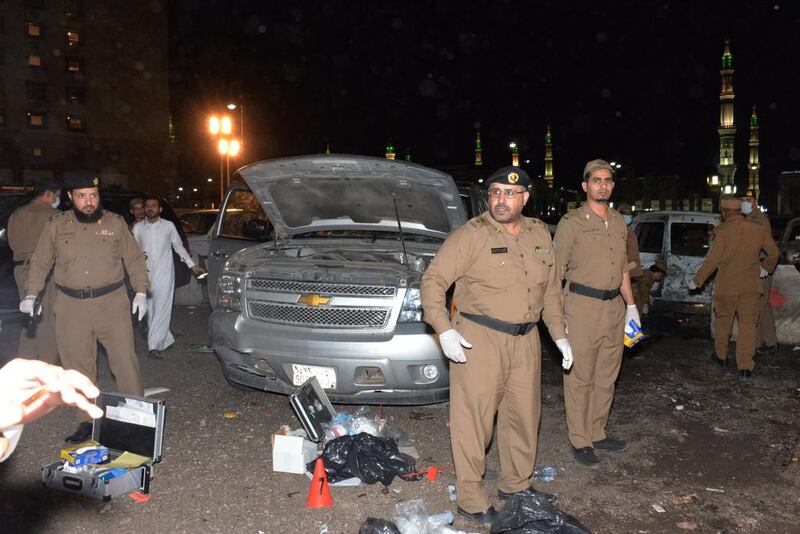ABU DHABI // The wave of ISIL attacks over the last ten days of Ramadan, from Turkey to Iraq, Bangladesh, Yemen and even as far as Malaysia, were designed to project an image of strength at a time when the terror group is being steadily routed on the ground.
But the three coordinated suicide bombings in Saudi Arabia on Monday – which culminated in an attack in Medina metres from the second holiest site in Islam – were a shocking escalation for the millenarian cult and may mark the beginning of an attempt to spark an insurgency against the Saudi state of the kind waged by its predecessor in the mid-2000s, analysts said.
“This campaign is likely not the end of the Islamic State’s suicide campaign, but only the beginning,” former FBI counterterrorism official Clint Watts wrote on the Foreign Policy Research Institute website on Tuesday, describing the wave of attacks in Saudi Arabia and beyond.
“Much like Al Qaeda in the Arabian Peninsula was for the Al Qaeda Central during their downturn, Islamic State Central will need an affiliate to carry the black banner forward or their caliphate experiment will crumble as fast as it was created.”
Overthrowing the rulers of Saudi Arabia has been a central goal of takfiri extremist groups stretching back to 1979, when fanatics claiming their leader was the Mahdi took over the Grand Mosque in Mecca. Osama bin Laden was deeply influenced by the event and members of that group who were eventually released from jail went on to join Al Qaeda.
One of Al Qaeda’s most influential ideologues, Abu Muhammad Al Maqdisi, was close to members of the 1979 group and was also the mentor of ISIL’s founder, Abu Musab Al Zarqawi.
Aimen Dean, who joined Al Qaeda in Afghanistan in the mid-1990s before becoming a spy for western intelligence agencies, said the episode was one of the first things new recruits were taught about, that it was “a righteous rebellion against tyrants” and a supposed playing out of Islamic prophecy.
The attack in Medina is “shocking to many people, but it didn’t come as a shock to me”, said Mr Dean, who is now a terrorism analyst. “They taught that Mecca and Medina are being usurped and controlled” by tyrants, and “now ISIS is taking that ideology to its extreme logical conclusion”.
Since the summer of 2014 when Abu Bakr Al Baghdadi delivered a speech from the 12th-century Al Nuri mosque in Mosul after ISIL captured the city, the group’s leader has only delivered one audio statement. The focus of that statement, which was delivered last May, was almost solely on Saudi Arabia.
“It is completely naive to think that Saudi Arabia is just one of ISIS’s targets,” Mr Dean said. “It is the most important ISIS target.”
The kingdom has endured numerous ISIL attacks over the past year, mostly against Saudi security forces and the minority Shiite community. ISIL cells in both Medina and Mecca were uncovered before being able to carry out attacks.
A campaign of militancy inside Saudi Arabia would in part be intended to demonstrate that the House of Saud, whose legitimacy is in part derived from its role as the guardian of Mecca and Medina, is unable to fulfil its duty.
“It was meant to embarrass the Saudis,” said Malcolm Nance, an expert on Al Qaeda and ISIL and a veteran former US military counter-terrorism official who was involved in the fight against Al Qaeda in the kingdom and now heads the Tapstri counterterrorism consultancy group.
Saudi state media said the bomber detonated his explosives while trying to walk toward the Prophet Mohammed’s mosque before maghrib prayers, but other reports stated that he deliberately approached security forces stationed outside the mosque who were having their iftar. ISIL has not claimed responsibility and, as with the attack on Istanbul’s Ataturk airport, might not, especially as outrage spreads among Muslims that their second most sacred site was attacked.
Mr Nance said ISIL social media accounts were distancing the extremist group from the bombing.
But “the fact they chose Medina is one step removed from attacking the Grand Mosque”, Mr Nance said. “I think it was a deliberate strategic attack on the mosque. That was them stepping their game up to put Islam on notice, that the elimination of traditional Islam is their main goal.”
ISIL has destroyed hundreds of graves and shrines of Islamic figures, including those of Quranic prophets, in Iraq and Syria, because Salafism generally forbids worship or veneration at graves.
The idea that they may try to attack the Prophet Mohammed’s tomb itself “is well within their ideological spectrum”, Mr Nance said. “Maybe they think they are indoctrinating the 1.7 billion Muslims in the world about the indecency of a structure that is not dedicated to the worship of God but a man.”
Such a fanatical act would cause revulsion among Muslims, but might galvanise ISIL’s supporters in the kingdom. “They have got to be ideologically the hardest core because they live in a land that is already orthodox, and to be ISIS you have to think that the most extreme orthodox Saudi imam is a raging liberal that must be killed – that’s their mindset,” Mr Nance said.
tkhan@thenational.ae





